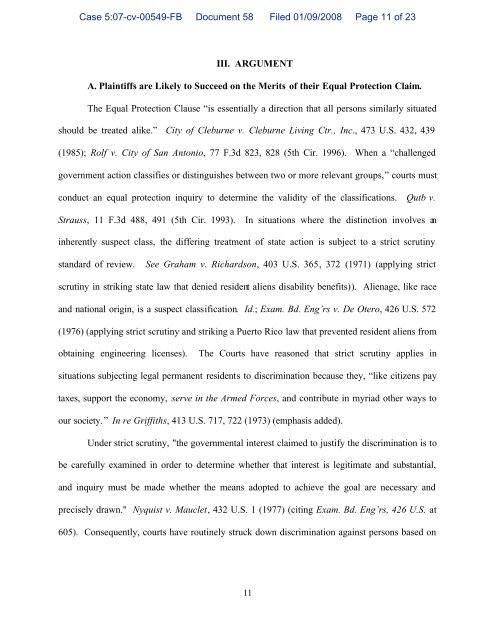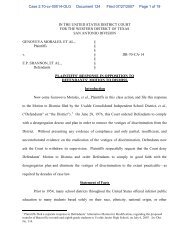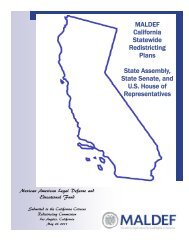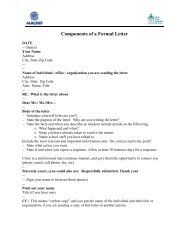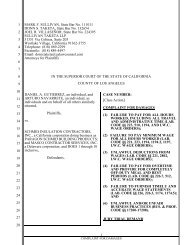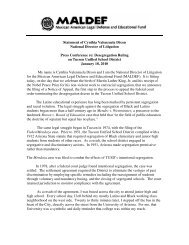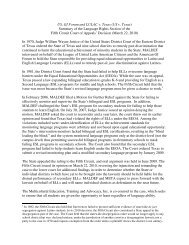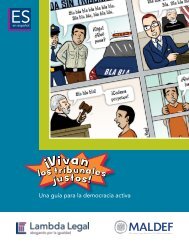plaintiffs' motion for preliminary injunction and brief in - maldef
plaintiffs' motion for preliminary injunction and brief in - maldef
plaintiffs' motion for preliminary injunction and brief in - maldef
Create successful ePaper yourself
Turn your PDF publications into a flip-book with our unique Google optimized e-Paper software.
Case 5:07-cv-00549-FB Document 58 Filed 01/09/2008 Page 11 of 23<br />
III. ARGUMENT<br />
A. Pla<strong>in</strong>tiffs are Likely to Succeed on the Merits of their Equal Protection Claim.<br />
The Equal Protection Clause “is essentially a direction that all persons similarly situated<br />
should be treated alike.” City of Cleburne v. Cleburne Liv<strong>in</strong>g Ctr., Inc., 473 U.S. 432, 439<br />
(1985); Rolf v. City of San Antonio, 77 F.3d 823, 828 (5th Cir. 1996). When a “challenged<br />
government action classifies or dist<strong>in</strong>guishes between two or more relevant groups,” courts must<br />
conduct an equal protection <strong>in</strong>quiry to determ<strong>in</strong>e the validity of the classifications. Qutb v.<br />
Strauss, 11 F.3d 488, 491 (5th Cir. 1993). In situations where the dist<strong>in</strong>ction <strong>in</strong>volves an<br />
<strong>in</strong>herently suspect class, the differ<strong>in</strong>g treatment of state action is subject to a strict scrut<strong>in</strong>y<br />
st<strong>and</strong>ard of review. See Graham v. Richardson, 403 U.S. 365, 372 (1971) (apply<strong>in</strong>g strict<br />
scrut<strong>in</strong>y <strong>in</strong> strik<strong>in</strong>g state law that denied resident aliens disability benefits)). Alienage, like race<br />
<strong>and</strong> national orig<strong>in</strong>, is a suspect classification. Id.; Exam. Bd. Eng’rs v. De Otero, 426 U.S. 572<br />
(1976) (apply<strong>in</strong>g strict scrut<strong>in</strong>y <strong>and</strong> strik<strong>in</strong>g a Puerto Rico law that prevented resident aliens from<br />
obta<strong>in</strong><strong>in</strong>g eng<strong>in</strong>eer<strong>in</strong>g licenses).<br />
The Courts have reasoned that strict scrut<strong>in</strong>y applies <strong>in</strong><br />
situations subject<strong>in</strong>g legal permanent residents to discrim<strong>in</strong>ation because they, “like citizens pay<br />
taxes, support the economy, serve <strong>in</strong> the Armed Forces, <strong>and</strong> contribute <strong>in</strong> myriad other ways to<br />
our society.” In re Griffiths, 413 U.S. 717, 722 (1973) (emphasis added).<br />
Under strict scrut<strong>in</strong>y, "the governmental <strong>in</strong>terest claimed to justify the discrim<strong>in</strong>ation is to<br />
be carefully exam<strong>in</strong>ed <strong>in</strong> order to determ<strong>in</strong>e whether that <strong>in</strong>terest is legitimate <strong>and</strong> substantial,<br />
<strong>and</strong> <strong>in</strong>quiry must be made whether the means adopted to achieve the goal are necessary <strong>and</strong><br />
precisely drawn." Nyquist v. Mauclet, 432 U.S. 1 (1977) (cit<strong>in</strong>g Exam. Bd. Eng’rs, 426 U.S. at<br />
605). Consequently, courts have rout<strong>in</strong>ely struck down discrim<strong>in</strong>ation aga<strong>in</strong>st persons based on<br />
11


